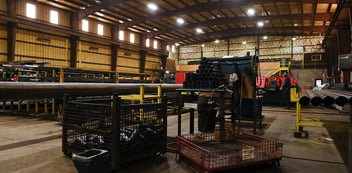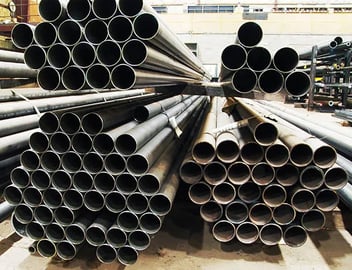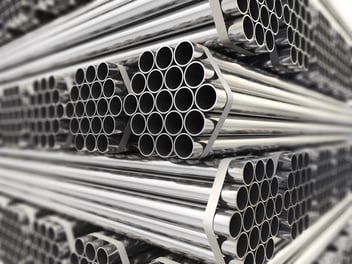Pros and Cons of Outsourcing Your Metal Services

Outsourcing has become a game-changer in the industrial sector, offering businesses a smart way to streamline operations and boost efficiency. By partnering with independent contractors or specialized firms for tasks like production, customization, or parts fabrication, companies can stay focused on what they do best while reaping the benefits of high-quality outputs. This strategy not only cuts costs but also brings in expertise and resources that might otherwise be out of reach.
A key advantage of outsourcing metal services is cost control. It allows companies to acquire high-quality materials at a fraction of the cost it would take to produce them in-house.
6 Benefits of Outsourcing Metal Services
Some tasks for projects are time-consuming and the least profitable. For those tasks, partnering with a reliable company that not only has the experience and the necessary machinery but also a reliable staff increases the likelihood of finishing on time and providing your clients with top-notch service. Here are six advantages of outsourcing for metal services:
- Cost efficiency
- Access to specialized expertise
- Flexibility and scalability
- Fast turnaround times
- Risk mitigation
- Conservation of capital and resources
Opting to outsource for metal services means reducing the need for in-house equipment and maintenance. It also means less of your budget has to be spent on labor, training, and operations related to those tasks. With any project, it is crucial to only pay for the services you need, which is exactly how outsourcing is to your advantage.
2. Access to Specialized ExpertiseLeveraging the knowledge of experts who focus solely on metal services means you can get the job done using the latest techniques and best practices in the industry.
3. Flexibility and ScalabilityPartnering with another company means you have the ability to handle both large and small projects without altering in-house capabilities. This expands your business potential without requiring a significant investment in your facilities.
4. Fast Turnaround TimesWorking with a company that specializes in metal services means an immediate start to the task, without a need to bring staff up to speed. It also means quicker project completions.
5. Risk Mitigation
Service providers often have their own insurance, reducing liability for businesses. They also are on track with industry standards and regulations, regularly conducting compliance checks of their own.
Outsourcing allows you to divert funds to core business activities, rather than investing in expensive equipment and the need to hire specialists. Likewise, having experienced staff handle the tasks means greater efficiency and, therefore, less waste.
3 Drawbacks of Outsourcing Metal Services
As with any project, choosing to outsource has potential disadvantages as well. We would be remiss if we didn’t mention three of those, including:
- Quality concerns
- Dependency on external entities
- Long-term cost implications
Working with the wrong partner can mean the potential for inconsistency, as well as communication issues. However, finding the right partner means you will have the confidence that your partner can handle your order efficiently and deliver in a timely manner.
2. Dependency on External EntitiesHaving work completed for you can be concerning due to the potential for outside issues disrupting the project timeline. However, an established partner can alleviate these concerns and ensure you won’t have to find an alternative solution as your project nears completion.
3. Long-Term Cost ImplicationsOver-reliance on a partner for specific project needs might result in higher costs in the long run if market conditions change.
About State Line
State Line offers reliable metal services. We have decades of experience in the metal industry, and our staff are experienced and capable of handling your order in a streamlined manner. Our Kanban services provide separation as required for traceability, and our specialization in custom orders means we are well-versed in providing high-quality service in any situation.
We handle the work that cuts into your profit margins, allowing your workforce to stay on task for the right-fit projects in progress. If you are looking for a personalized approach to service and a solution to help you meet deadlines during an overflow period of work, we are available to assist.
Outsourcing Means Savings: Time and Money
While outsourcing metal services offers numerous benefits, it's essential to weigh them against potential pitfalls. Careful consideration and planning must go into any decision to outsource. Doing so can help you save costs, time, and effort while getting the best quality of work for your project.
State Line is proud to provide our clients with an outsourced metalworking solution that can be tailored to their specific needs within budget.
For more information about our services, please visit the Services Page.
Answers to Common Questions About Outsourcing Metal Services
1. How can a company effectively select a reliable outsourcing partner for metal services?
To select a reliable partner, research companies with a proven track record in your required services. Request proposals with clear timelines and quality standards, and visit facilities if possible. Establish strong communication and set measurable expectations to ensure a productive relationship.
2. What are the specific cost implications of outsourcing metal services compared to maintaining in-house operations?
Outsourcing can lower costs by reducing the need for expensive equipment, facilities, and skilled labor. Vendors may offer economies of scale, but additional expenses like shipping and quality oversight must be considered. A cost-benefit analysis comparing outsourcing to in-house production will clarify the financial impact.
3. How does outsourcing metal services impact a company's control over quality assurance and adherence to industry standards?
Outsourcing can shift some aspects of quality control to the provider, which makes choosing the right partner essential. Working with companies that have strong quality assurance practices and adhere to industry standards can help maintain high-quality outputs. Regular communication, clear expectations, and processes like audits or service-level agreements can ensure your standards are met and quality remains consistent throughout the partnership.



